- Home
- Giles Foden
Zanzibar Page 22
Zanzibar Read online
Page 22
Then the rock moved and, with a howl of surprise and fear, got to its feet. Suddenly Nick realised there was a man there in the moonlight with them, a kikoi flapping around him.
As Leggatt was standing up, the man – he smelt strongly of fish oil – demanded something loudly in Swahili. Three other forms rose from their beds in the sand and began shouting.
‘Run for it,’ Leggatt urged. ‘I’ll meet you at the dhow.’
Before the drowsy men could lay hands on them, the two of them started sprinting down the beach. But it was too late. The door to the cottage had opened and a powerful flashlight was flicking across the sand. Nick saw its beam fan their running feet. He could hear Leggatt’s breath rasping behind him.
Another sound came, so ear-splitting and intense it could hardly be characterised as a sound at all, more like a feeling deep in the gut. Someone was shooting at them from the cottage. Nick felt the bullets whistle past, spitting at the sand round his feet. The light flashed again.
‘Get down!’ he cried to Leggatt over his shoulder, as another volley of bullets swept over them.
Nick flung himself gasping on the beach and looked back anxiously, worried that the old man had been hit or had not been able to keep up with him. He saw a wild-haired figure in the gleaming spotlight. Then the bullets sprayed again, tugging up the sand so it filled Nick’s eyes. He wiped it away, in time to see Leggatt lurch to one side, trying to move out of the light. He seemed to have managed it. He was astonishingly agile for an old man. Then there was a thud and, with a deep groan, Leggatt pitched over and fell face first in the sand.
Nick stood up and ran towards him. There was another series of bangs, very close this time, and immediate sudden pain – a bullet creased his temple and tumbled him over.
* * *
The next thing he remembered was being dragged up a staircase. His head bumping against every step, blood streaming from his face. Then ropes binding him. Two lights: the bright one of the flashlight, electric white; the flickering, piss-coloured one of a hurricane lamp. Face down, dusty planking in his mouth, as they tied and tied. Voices speaking in Arabic.
Then somebody lifted him up like a doll and flung him against rough masonry. Finally, a heavy door dropped shut, and the darkness was complete.
* * *
He woke with dried blood stuck to his face and throat. It covered most of one side, like a mask. He tried to move, then remembered his hands were tied. There was something else, too. A noose around his neck. Passing through his bound hands and behind his back, it was linked to another rope, one that held his ankles together. He panicked, throwing himself from side to side on the wooden floor and hyperventilating.
Calm yourself, his own voice said to him. Breathe. Slowly, he curbed his anxiety a little. He rolled back to his original position, slouched against the wall – limbs and rope in a single insoluble knot. He could feel the stippled surface of the rough-plastered wall in his back. Air touched his face. Air and sun, streaming in through a square, glassless window. He was in the lighthouse. Yes. It was the same window out of which he and Miranda had gazed, only a few days previously. He could see the burner in the middle of the room, beside it the trapdoor that opened from the stairs. Then the memory of what had happened the previous night rushed in upon him: Leggatt’s face falling in the flashlit sand, the sudden pain of his own wound. Blood in his eyes.
He knew that Leggatt must be dead. Not just because the Englishman wasn’t trussed beside him in the lighthouse. It was the way, like lumber just struck, the old man had fallen. Nick realised that tears were streaming down his cheek, softening the bloody mask.
Maybe he was wrong? Maybe Leggatt was OK, and they were keeping him elsewhere. But already he knew this hope was false. The old guy – his habit of mind as outmoded as some dog-eared sticker on a leather suitcase – he wasn’t coming back. Or if he was, it was as a voodoo revenant, lifting the grave’s lid in the dead of night. Or flapping hideously out of the mangroves like the papabawa.
Nick knew it was more likely that there was no grave, that these people, whatever they were doing, had left the body there on the sand. He shuddered at the thought of crabs and seabirds tearing at the old man’s flesh. It was then he heard the footsteps on the tower stairway. His stomach churned as he counted them.
The trapdoor lifted. A fat, shaven head emerged, followed by a pair of meaty shoulders.
The man who stood in front of him was enormous. Nick recognised him from his surveillance. But at a distance he hadn’t quite taken in his size, his bull-like aspect. The man was dressed in jeans and a denim shirt. On his feet were a torn pair of sneakers. But it was his face – and something in his hand – that drew Nick’s attention. The high-domed forehead, stubbly at the hairline, the flat, wide nose and tiny, set-back ears. Most of all the eyes: the hazel disguise of two black points of hate.
The thing in his hand was a panga. It swung back, then down, towards Nick’s leg.
At the last second, it seemed, the man changed his grip. It was the flat of the blade that hit Nick’s knee. He cried out as metal struck bone, and rolled over on his side. The man crouched down beside him, yanked him up by the neck-noose.
‘Who are you? Why you watch us? You American, yes?’
Nick thought quickly. ‘I’m Greek!’
The man stood up. A little smile curled his lips. Again the blade came down. The other knee this time, only the grip was slightly wrong. Or right. It made a gash. Almost losing consciousness with the pain of it, Nick gave a series of jolting whelps. Then tried to worm his way down into the wooden floor of the lighthouse.
‘Oh no, mister. I think you are in a mistake. I think indeed you are American. I think maybe your government has sent you here to spy on us. American!’
He knelt down close, so close his breath was on Nick’s face.
‘Mister, do you know what that means?’
His tongue lolling out like a dog’s, Nick shook his head in desperation.
‘It means you are the devil’s shit.’
Laughing, his belly shaking, the man stood up once more. He pulled Nick’s rope, dragging him across the floorboards.
‘OK,’ the man said. ‘I have work. We talk tomorrow. Why I don’t kill you? So we can see what you know in your agent’s head. Today, tonight, you rest.’
He took another length of rope and attached one end to Nick’s ankles and the other to the lighthouse cast-iron burner.
‘Yes, devilshit. You rest nice. Then tomorrow you can tell me all about it.’
With that the giant Arab suddenly crouched down again and, scooping Nick up bodily, bundled him out of the lighthouse window.
The rope snaked out behind him.
Nick was so surprised he didn’t realise what was happening – blue sea and sky and green forest tumbling round him in angled planes. The rope attaching him to the burner jerked tight. His head banged hard on the white-painted stonework of the lighthouse.
Concussed, dangling upside down, Nick Karolides began to take leave of himself. As his battered body swung to and fro, all manner of confusion filled his mind. A woman’s body (Miranda: he tried to catch her to him, a preservative from evil), his work (two lobsters in companionable conversation), something of Leggatt (an old British navy sextant he kept on the chart table of the Winston Churchill), something of his mother (her passion for decorative flowers). He could see sky and forest and the rough stone face of the lighthouse, but it was all chopped up, chaotic, following the wild hurry of his mind.
Flashes of lucidity came and went. His limbs trembled. The last thing he saw, high up there beyond the flaking paintwork, was a swirling mass of birds, making a pattern in the blue sky. Tiny, riding the amazing dark cloud of themselves. Leggatt had spoken of this. Of a species acting out – something called a dread – in the sky. What were they? He couldn’t get the name now, not now, not now. Quaglia? Gwalia? Something like that. It didn’t matter any more, anyway. The cloud of birds was breaking up, retinal signals disinte
grating into black spots of thought, the animation of consciousness itself, intense and almost indescribable. Then – dancing, fading, finally absent – the pattern itself was gone, to be replaced by something utterly unnameable. His bound throat gave a little gurgle.
* * *
During the night, it all came down on the lighthouse. Rain and lightning and hail. Another storm. On guard, Khaled sat in front of the fire they had made in the cottage. He huddled closer, trying to keep warm in the chill the storm brought with it. He had always hated thunder.
Every now and then, he went to the door and looked outside. Once, when the sky lit up, he saw the shape hanging from the lighthouse. He supposed the American was dead by now, like his friend. It made him feel bad. There had been too much death on this mission already. Not the death which was their aim, but accidents, arrivals that had to be dealt with.
The day before the whites came, two Zanzibari fishermen had landed on the island: looking for turtle eggs, Khaled suspected. Yousef, who had been wiring up – detonation cord and blasting caps strewn over the table in the cottage – quickly covered everything with a blanket. Zayn had been friendly at first, telling Khaled to give the visitors cups of tea. Then, as they were drinking these – sitting on their haunches outside the door, chatting to Khaled in Swahili – Zayn had approached them with stealth from inside and slit their throats. The blood went all over the step, and they had to throw down sand after dragging away the bodies. Now there were three corpses hidden under brush at the edge of the beach.
The fire crackled. Rain swept down on the roof. The manner of the fishermen’s death – the crooked cuts in their throats like that – had disturbed Khaled greatly. It made him wonder. It gave rise to doubts.
Next door, Zayn stirred dimly – then returned to a regular snore.
‘You can bury them tomorrow,’ he had said. ‘Or weigh them with rocks and take them out to sea. With the other.’
‘You didn’t have to do this,’ Khaled had said. ‘You could have just let the fishermen go on their way. They were plain men, simple men, they would not have understood what we are doing here.’
‘They could have talked, brought policemen from Stone Town.’
Zayn had clapped him on the shoulder, jovially at first and then again, harder and harder, his voice rising as he spoke.
‘Are you soft, my friend? Perhaps you are not strong enough for this work? Not committed enough. Is your faith weak? Perhaps I need to talk to the Sheikh about you. He will be very disappointed if you are shown not to be worthy of this mission.’
The big man had finally pushed him to the ground, and walked back up to the cottage, where Yousef was boiling rice over the fire. Khaled had lain there for a while in the sand, his shoulder aching and tears welling up in his eyes. Then he had joined them for supper, at which both he and Zayn acted as though nothing had happened.
Now, as the other two slept on the floor in the bedroom next door – the Nairobi dhow had left, with the other men – Khaled kept watch, sharpening a piece of stick with his knife and poking the fire with it. He felt angry and afraid. Tomorrow they would begin their own journey, perform their holy task, once the crates had been lodged in the second dhow. He and Yousef would sail it to Dar-es-Salaam port – mainly him, since he knew how to sail the things – that had been agreed. Zayn would follow at a discreet distance in the cruiser, until they neared the port, at which point he would veer off up the coast and moor in a cove and wait.
They would make their escape in the cruiser, eventually meeting with a cargo ship in which two berths had been arranged through a marine broker. Or two of them would. There was still another matter to be resolved, the most holy and terrible part of all the work. Either he or Yousef had to drive the truck in which the crates would be loaded. It was a mission that truly served the cause of jihad, for it meant certain death. There were buttons in the cab. Only one person would be joining Zayn in the cove.
Khaled looked into the fire. It had not escaped his attention that Zayn had somehow been counted out of the reckoning for this aspect of the mission. Something else was still disturbing him too. The expressions on the faces of the dead fishermen, the shape of the gashes in their throats, the blood on the floor … The horrific scene of his discovery of his parents came back to him powerfully, bringing to the surface of his mind things that had been bubbling under during all his training, things that he had tried hard not to think. Why had Zayn been so vague about the killings? What was it his father had done that had angered the Americans so much? A terrible possibility flitted through Khaled’s mind. He dismissed it quickly and thought about his own standing in the organisation. Zayn’s questioning of his abilities and commitment had raised strong feelings in the young man.
It was these feelings – though he could hardly disentangle the anger and the wounded pride and the fear and the pity, for himself and for others – it was these that made him, on catching another lightning flash of the hanging man, suddenly stand up. He took down the hurricane lamp from the doorpost and, putting his knife in his waistband, began walking along the path that led to the lighthouse. The rain hissed on the hot lamp, threatening to snuff it out. But he walked slowly, letting the rain stream over him, as if its cooling waters might wash away all confusion and aid understanding. Either side of him, the spectral forest twisted in the wind.
On reaching the foot of the lighthouse he looked up at the black shape of the man. For an instant he thought he could hear him moaning. Maybe he was still alive?
It was probably the wind. Khaled opened the lighthouse door and stepped inside. He began climbing the stairs, his uncertainty mounting with every step. On entering the upper chamber, he held up the lamp. Flickering on the mirror of the burner and bouncing off the walls, it made the place seem beautiful, a world of light. Then he saw the rope – a taut black line leading from the burner to the window.
He put down the lamp and started pulling on the rope. The body was terribly heavy. He had great difficulty lifting it over the sill into the room, whereupon it dropped like a bale of meat.
The man’s head hit the floor with a loud thump. Khaled began to worry that Zayn might discover him. Doing – what? He still didn’t know exactly. It was inexplicable to him. Maybe the reason was that hideous possibility concerning his parents, that possibility which he could not consciously acknowledge, did not dare to fully recognise – since it would make him tragic, or someone who had been manipulated by evil, or someone who was just a dupe. He could accept none of those things. They made the voice in his mind speak too loud. Or maybe it simply struck him that the death of this man could no more be part of jihad than the death of the fishermen, and would therefore be a sin. On the other hand, if Zayn spoke the truth, the man was American, and in Khaled’s mind all members of that nation stood charged with the murder of his mother and father … At least, they had until recently. He was confused. The sea wind was roaring in the trees outside. He reached out and touched the man’s cheek. It felt cold, but that might have been just from the rain. Then he gave a start and trembled. He brought the lamp closer. He was being foolish. He knew now what he must do.
* * *
Khaled was woken by a kick in the ribs. Zayn’s face was in his. Stubble. Night breath.
‘So. You slept. And now the man is gone. Our prisoner. I believe he may have been an agent of the United States government. I had wished to interrogate him further before his death. And now –’
Another kick. Zayn was bare-chested. Black hair covered his heavy torso like the pelt of an animal. It was darker than his shaven head, and softer looking.
‘And now he has escaped.’
He took Khaled by the collar and forced his face down into the smouldering coals of the fire.
‘Maybe that is what you are also. A spy for the Amerikani.’
‘No! You know that is not true. I can explain, the man …’
‘I must punish you.’
Khaled felt the flesh on his face begin to blister.
‘Wait!’ he spluttered, into the hot ashes. ‘I have something to show you.’
Zayn paused, and lifted him up.
‘What can you show me? You are a coward, and lazy. You do not believe, in spite of the injustice done to your family. You dishonour their memory with your laxness and bad actions.’
‘Let me show you.’
The bare-chested Palestinian loosed his grip. ‘Very well. What?’
Khaled got to his feet, his scorched face grey with ash. He reached into his pocket, drew out something and proffered it: a severed human ear, roughly hacked.
‘The man made noises in the night. He was trying to undo his bonds. So I killed him with my knife.’
A slow smile spread across Zayn’s face as he studied the ear lying in Khaled’s palm. But then he frowned.
‘So where is the body?’ he asked abruptly.
‘You said we were to deal with them. So this morning, at first light, I picked rocks from the beach, to weigh them like you said, and took him and the old one out in the small boat and sunk them, together with those of the fishermen.’
He waved the ear in front of Zayn, a red-fringed petal between finger and thumb.
‘I kept this to show you, uncle,’ he said imploringly. ‘So you know I acted well.’
Zayn looked at him distrustfully. ‘I wanted to question the Amerikani.’
‘I thought you would be pleased,’ Khaled said anxiously.
As Zayn’s hard eyes fixed on him again, Yousef emerged from next door in a pair of white underpants.
‘What is happening please?’ he asked bemusedly, looking from one of them to the other.
‘Nothing,’ shouted Zayn. ‘Go, make your ablutions. Then we must pray, eat our food and set off. The day is here. There is no time for all this talking.’
He turned back to Khaled. ‘You I will deal with later.’
‘You leave one task unmentioned,’ said Yousef, quietly.

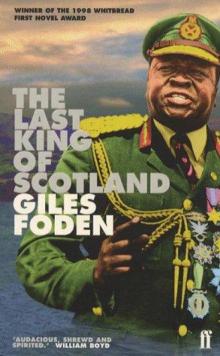 The Last King of Scotland (1998)
The Last King of Scotland (1998)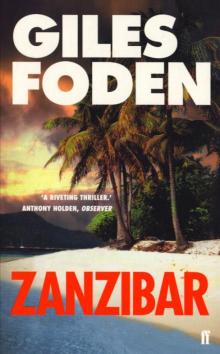 Zanzibar
Zanzibar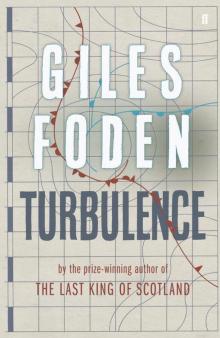 Turbulence
Turbulence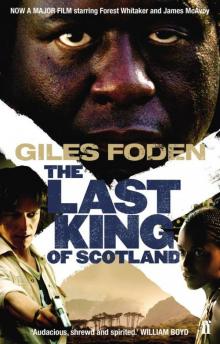 The Last King of Scotland
The Last King of Scotland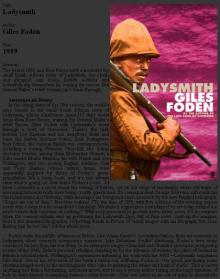 1999 - Ladysmith
1999 - Ladysmith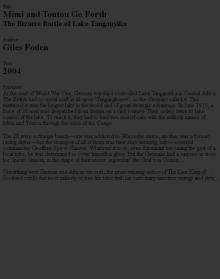 2004 - Mimi and Toutou Go Forth
2004 - Mimi and Toutou Go Forth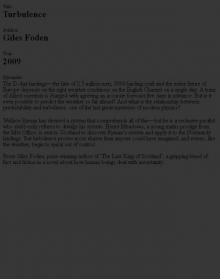 2009 - Turbulence
2009 - Turbulence